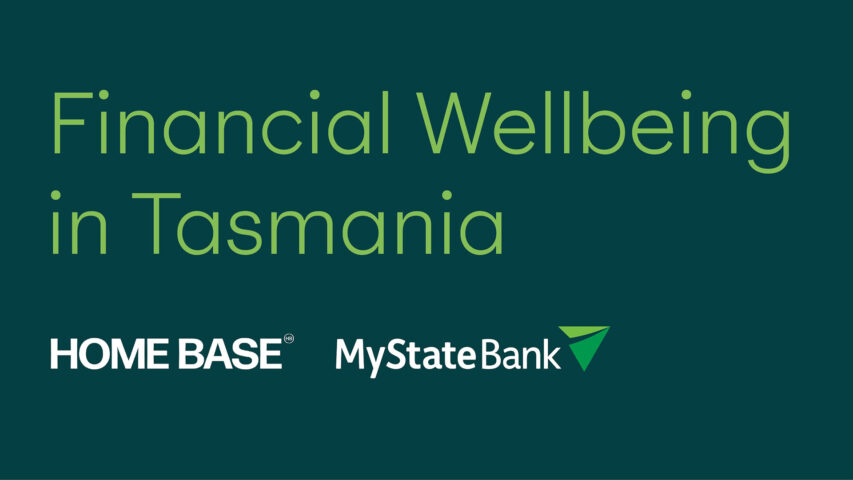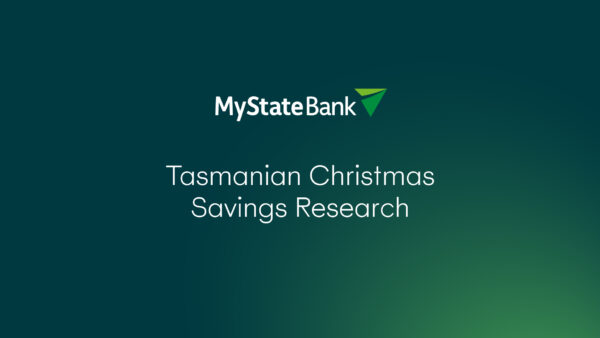Young Tasmanians Rely on Buy Now, Pay Later to Sustain Lifestyles

The Financial Wellbeing in Tasmania Report released today, reveals nearly half of Tasmanians under 35 are turning to Buy Now Pay Later (BNPL) services, and more than one in three are dipping into their savings to maintain their lifestyle—despite a surge in post-election optimism about the year ahead.
These are some of the key findings from the latest MyState/Home Base Tasmanian Financial Wellbeing Report, based on data collected in the two weeks following the Federal Election and Labor’s decisive victory.
The report reveals a striking contrast: while financial confidence has jumped—particularly among younger Tasmanians - many are still grappling with financial instability.
Confidence Rising, but Pressures Persist
Overall, 52% of Tasmanians expect to be better off financially in 12 months, with that figure rising to 68% among those under 35. More than 60% of younger Tasmanians believe their net income will grow over the coming year—more than double the general population (25%).
But behind the optimism lie concerning trends:
- 48% of Tasmanians under 35 are using BNPL services
- They are twice as likely to hold payday loans (9% vs 4%)
- 1 in 5 have no savings buffer
- 40% have less in savings than a year ago
MyState Ltd Managing Director and CEO Brett Morgan said “it’s encouraging to see optimism about the future, but the number of young Tasmanians relying on high interest non-bank credit to cover everyday costs is a real red flag.”
“That’s why financial wellbeing isn’t just about income - it’s about education, habits, and understanding how lending and saving works.”
“We know people feel more in control when they understand how to manage their money,” Mr Morgan added.
Younger Tasmanians are also increasingly relying on social media and financial apps for money advice, and one in three have missed a debt repayment in the past year.
Missed Repayments Common Across All Age Groups
The report highlights that financial stress is widespread:
- 47% of Tasmanians occasionally or regularly miss personal style loan repayments
- 39% miss credit card payments
- 36% miss BNPL repayments
- 18% miss HECS/HELP or student loan repayments
Home Base CEO Dianne Underwood raised concerns about the increasing use of Buy Now Pay Later (BNPL) services among young Tasmanians.
"With 36 per cent missing their BNPL repayments, we're seeing the darker side of these easy to access payment options.
Young people are trying to juggle multiple, complex repayment arrangements that quickly become overwhelming,” Ms Underwood said.
“This highlights just how important it is to provide a place where young people can get help when they’re facing financial challenges.
“Equally concerning is the report’s finding that one in five Tasmanians have no savings at all, and 40 per cent have seen their savings eroded over the past year.
“Now more than ever, sound financial education and wrap-around support is critical to helping young Tasmanians build financial resilience.
“Our experience shows that with the right guidance and support, young people can overcome challenges and develop lasting financial wellbeing.”
Encouragingly, young Tasmanians are less likely to carry unpaid credit card debt (19%) compared to the broader population (28%).
Other Key Insights
- 1 in 3 Tasmanians have no significant debt
Over the past year:
- 22% increased their savings
- 25% maintained them
- 33% reduced them
- 10% have no savings at all
- 36% have enough savings to cover three months or more of expenses
Where Tasmanians Get Their Financial Advice
- Most don’t rely on anyone else
- 33% turn to family and friends
- 15% consult a financial advisor
- 14% use government websites
- 12% rely on social media
Policy Impact Uplift
Following the Federal Election, 24% of Tasmanians say government policies have improved their financial security - particularly energy subsidies and subsidised healthcare. However, 38% report no change, and another 38% remain unsure.
The Tasmanian Financial Wellbeing Report is conducted biannually and surveys 500 Tasmanians to track changing perceptions of financial wellbeing, debt, income expectations, and resilience.



